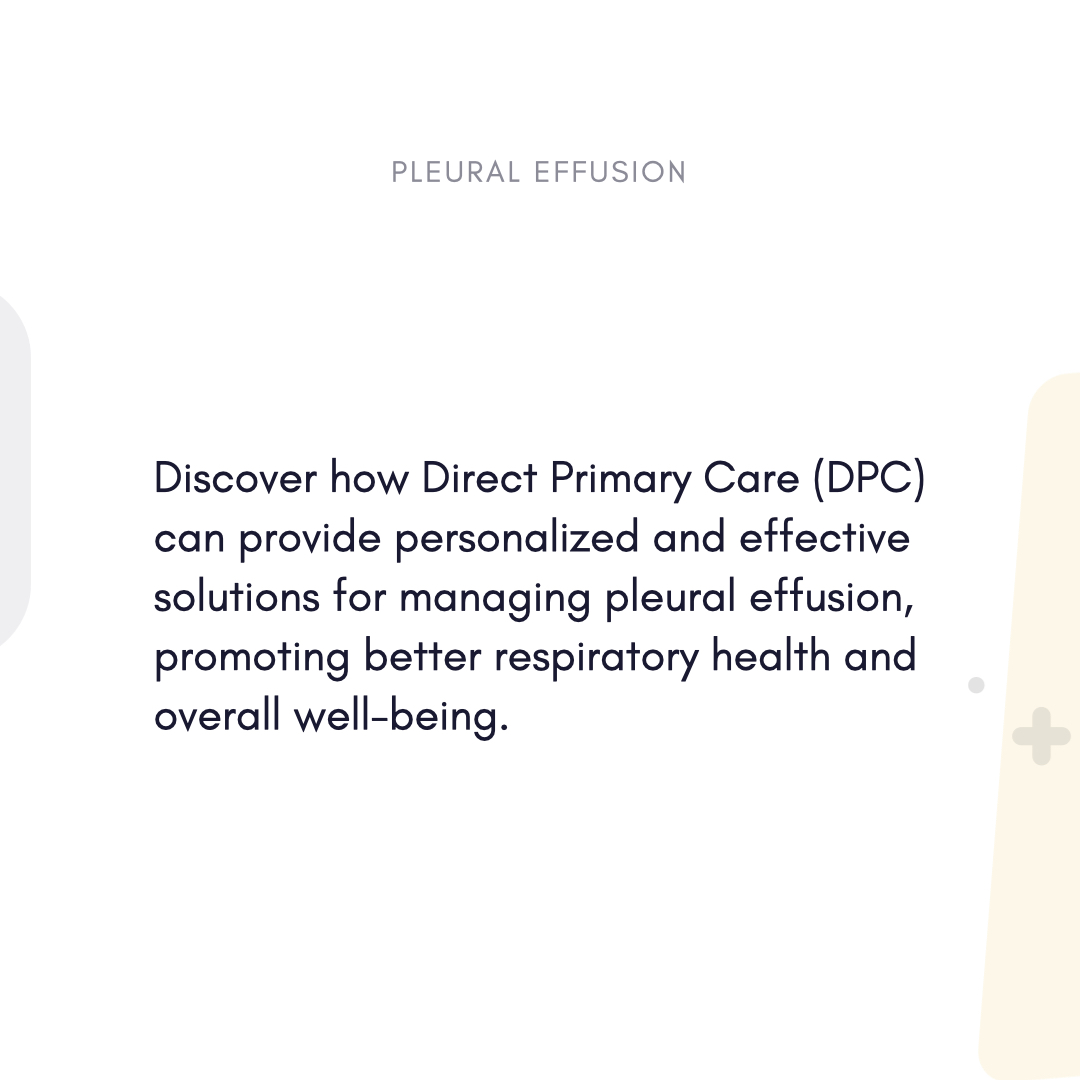Pleural Effusion and Direct Primary Care (DPC): Breathing Easier with Personalized Care
A weight in your chest that saps your life force. A cough not going to go away. For 1.5 million Americans suffering with pleural effusion every year, this fluid accumulation around the lungs not only causes discomfort but also can indicate heart failure, cancer, or infections like pneumonia. Though there is hope: Direct Primary Care (DPC) offers a vigilant, patient-centered method to control effusions and address root causes. Traditional treatment sometimes delays important drainage or miscoordinates specialists.

Comprehending Pleural Effusion
Pleural effusion is aberrant fluid accumulation in the pleural space usually resulting from:
- Most usually occurring cause is heart failure.
- Either TB or pneumonia
- Cancer—lung, breast, mesothelioma
- Autoimmune disorders including rheumatoid arthritis and lupus
Symptoms include:
- Dyspnea, particularly when lying down
- Chest ache or a dry cough
- Tiredness and lower exercise tolerance
Unmanaged effusion: hazards
- Lung collapse, sometimes known as electasis
- Empyema, or septic from contaminated fluid
- Failure of respiratory function
Early thoracentesis is stressed by the American Thoracic Society to identify etiology and direct therapy.
How DPC Changes Pleural Effusion Treatment
Usually costing 100 USD–200 USD per month, Direct Primary Care (DPC) runs on a membership model and provides flat fee access to your physician. This translates for effusion patients into no co-pays, no prior authorization delays, and a treatment plan as flexible as your needs.
1. Quick Identification and Drainage
The easily available DPC model guarantees:
- Same-day dyspnea or chest pain evaluations.
- Immediate imaging: Chest X-rays or ultrasounds at agreed upon rates.
- Coordinating thoracentesis: arranging drainage not in days but in hours.
2. Individualized, Interdisciplinary Treatments
DPC doctors design customized plans compliant with pulmonology recommendations:
- Management particular to etiology:
- Heart failure: coordination of cardiology and diuretics.
- Malignant effusions: talc pleurodesis or tunneled pleural catheters.
- Targeting antibiotics or antifungals, infections.
- Control of symptoms: either oxygen treatment or painkillers free of opioids.
3. Complete, Reasonably Expensive Support
DPC lowers medical and financial risk by:
- Thoracentesis for 500 USD costs less than 3,000 USD+ hospital fees.
- Access to telehealth services 24/7: Following post-drainage issues including pneumothorax.
- Managing underlying diseases (e.g., maximizing CHF treatment) should be the preventive focus.
DPC's advantages for pleural effusion sufferers
1. Unmatched Reachability
- Direct specialist coordination: same-day oncologist or pulmonologist referral.
- No ER waits for procedures booked in a few hours—urgent drainage.
2. Customized Interventions
- Repeated effusions: Indwelling pleural catheters for home drainage.
- Palliative care: Combining goals of cancer treatment with effusion control.
3. Open Affordability
- Included are consultations, imaging reviews, and care coordination under membership.
- Usually savings of 5,000 USD+ by avoiding specialist co-pays and hospital admissions.
Personal Success Stories from Real Life
- Case 1: John, 68, battled repeated effusions and heart failure. His DPC doctor linked him with a cardiologist, optimized his diuretics, and planned weekly thoracenteses. Effusions corrected, preventing hospitalization.
- Case 2: Linda, 55, had fast fluid reaccumulation from metastatic breast cancer. Her DPC provider checked hospice integration, taught home drainage, and set up a tunneled catheter. She spent her last months at home in great comfort.
Ask questions about pleural effusion and DPC.
- Q: Can DPC manage crises including tension effusion?
- A: Definitely. Often securing cash-pay discounts, DPC doctors coordinate direct ER admissions and tube thoracostomy as needed.
- Q: For effusions linked to cancer, is DPC reasonable?
- A: Exactly. Through proactive care, members avoid 10,000 USD+ hospital stays and save on repeated treatments.
- Q: If I require surgery or a thoracoscopy, what then?
- A: A DPC doctor negotiates self-pay rates and speeds VATS operations by working with thoracic surgeons.
Why DPC Wins for Patients Affected by Effusion
Emphasizing DPC's alignment with effusion recommendations, the American College of Chest Physicians supports:
- Early thoracentesis can help to detect infection or cancer.
- Integration: Perfect treatment between palliative teams, experts, and main providers.
- Tools for tracking fluid levels and symptom patterns help empower you.
Freely Again: Breathe
Pleural effusion need not force your life to be suffocating. With DPC, you get a partner who fights for every breath—yours, acts quickly, coordinates holistically.






